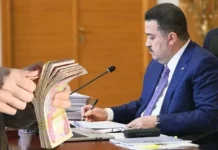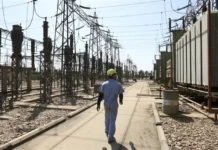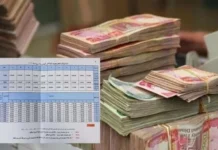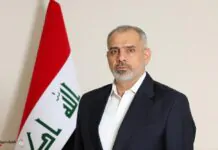Tishwash: The disbursement of salaries for Kurdistan employees for the month of May begins tomorrow and ends on Sunday.
The Ministry of Finance and Economy in the Kurdistan Region announced on Thursday that the distribution of employee salaries for the month of May will begin tomorrow, Friday, and end on Sunday.
May salaries will be disbursed starting on Friday (July 25, 2025) and ending on Sunday (July 27, 2025).
Retirees who receive their salaries through the “My Account” system will be able to receive their salaries via ATMs on Thursday. link
Tishwash: Iraq is approaching Trump’s table and is no longer in the hands of the US Undersecretary of State.
Analysis by Dr. Ali Agwan
An Iraqi expert said that the US Secretary of State’s call today with Prime Minister Mohammed al-Sudani regarding the Popular Mobilization Forces and Kurdistan’s salaries indicates that Iraq is no longer a secondary issue in the hands of the deputy minister or a lower-level official. It is likely to become a clear priority for President Trump himself, following changes affecting the region’s economy, oil, and security.
Ali Agwan – Professor of International Relations and Strategic Affairs
ecretary of State Marco Rubio’s call with the Prime Minister indicates that the Iraq file has shifted from the Assistant Secretary of State for Near Eastern Affairs to the Secretary’s desk, and may later be transferred to the President’s desk! This means that the Iraqi file has shifted in the American strategic mind from a secondary issue to a diplomatic one with a direct security and economic impact in the coming period.
2- The targeting of foreign oil platforms in Iraq prompted the US Secretary of State to discuss two main options with the Prime Minister: Either the Iraqi government intervenes and does what is necessary to protect the oil sector and foreign companies in Iraq from drone attacks, or we do what is necessary and protect this sector as part of our national interests.
3- The US embassy’s description of the Popular Mobilization Forces (PMF) legislation as a law that serves Iran’s agenda in the region places al-Sudani in a complex zero-sum confrontation with his internal partners and Iran itself. It’s as if the US wants to tell al-Sudani that we want him to be clear with us. There’s no room for maneuver: Either side with Iran and support this legislation, or side with us and block it!! They want to tell him: Do you want to be on Iran’s side so that you can justify including Iraq in a new package of harsh sanctions? Or do you want to side with us so that we can give Iraq a special status, isolated from the policies of maximum pressure against Iran?
4- Informing Al-Sudani of the necessity of delivering the region’s salaries without delay indicates that the region is going through difficult and pivotal moments related to its economic reality. The United States realizes that it is almost impossible to resolve the oil crisis between Baghdad and Erbil in the manner Baghdad desires, given that there are American and non-American companies that have 50-year contracts with Erbil independently of Baghdad. The United States does not want to see the collapse of more than thirty years of cooperation with the region due to pressure from the Iraqi government to hand over the region’s oil to Baghdad in exchange for Baghdad handing over the region’s salaries. The minister wants to tell Al-Sudani, “Give the salaries to the region and do not get involved in the fine details with them, because a solution is impossible now!”
Does this constitute interference in Iraq’s internal affairs? Yes, but who can tell the United States not to interfere and prevent them from doing so? link
************
Tishwash: The Iraqi dinar reached a new record high against the dollar.
The foreign exchange market in the Iraqi capital, Baghdad, recorded a record high for the dinar against the dollar on Wednesday, reaching 1,380 dinars per dollar, compared to the previous value of 1,420 dinars per dollar. This decline, according to experts, is the result of a convergence of several internal and external factors, most notably the strict government measures taken by the Central Bank to limit speculation in the currency market, in addition to the country’s growing foreign exchange reserves due to the rise in oil prices , and enhanced cooperation with international financial institutions to control the movement of the dollar within the country.
The exchange rate of the dollar on the parallel (unofficial) market reached 1,380 Iraqi dinars to the dollar, the first time in two years. The official rate, set by the Central Bank of Iraq, is 1,310 Iraqi dinars to the dollar. The dollar has been fluctuating in price over the past period, reaching 1,700 dinars, while it has been stable for a long time at 1,450,000 dinars.
Financial and economic expert Rashid Al-Saadi told Al-Araby Al-Jadeed, “The recent decline in the dollar exchange rate against the Iraqi dinar is a direct result of a package of policies and measures adopted by the Central Bank of Iraq, in cooperation with other state institutions. These include restricting illegal foreign transfers, adopting an official transfer platform, and enhancing the flow of foreign currency through the Central Bank’s window. This has helped meet actual demand for the dollar and narrow the gap between the official rate and the parallel market rate.”
Al-Saadi explained that “the increase in foreign currency reserves, as a result of improved global oil prices and continued coordination with the US Treasury Department to monitor dollar movements, has given greater confidence to the markets and contributed to calming speculation. Maintaining this decline requires continued transparency in the currency sales window, expanding oversight measures for banks and exchange companies, and revitalizing the local production sector to reduce reliance on imports, thus reducing pressure on the dollar.”
He added, “The impact of the dollar’s decline on local markets has twofold consequences. On the one hand, the prices of some imported goods may decline, which would positively impact citizens’ purchasing power. On the other hand, some commercial activities that relied on the exchange rate differential in the parallel market to generate profits may be harmed.”
The financial and economic expert emphasized that “what we need today is long-term stability based on genuine economic reforms, not just a temporary improvement in the exchange rate. The continued decline in the dollar exchange rate against the Iraqi dinar requires a set of sustainable measures that enhance confidence in monetary policy and maintain market balance. To prevent this decline from being merely a temporary phenomenon, the government and the Central Bank must work to deepen financial reforms and expand the scope of structural solutions in the currency market.”
For his part, Mazhar Mohammed Saleh, financial and economic advisor to Prime Minister Mohammed Shia al-Sudani, said in media statements on Wednesday that the relevant decisions and policies taken by the Central Bank and the government will lead to narrowing the gap between the official dollar price and its price on the parallel market, in a path that may lead to reaching the stage of “congruence” between the two prices. He said in a press statement to the local Shafaq News Agency that “the gap between the official and parallel prices approaching less than 4% indicates entering the congruence stage, as this difference only represents the cost of transactions.”
In early 2023, Iraq announced the adoption of an electronic platform to monitor dollar sales and money laundering operations. This followed warnings issued by the Federal Reserve (the US central bank) and the Treasury Department’s sanctioning of several local banks for their involvement in suspicious activities. A bank statement stated that “it was decided to expand the external transfer channels for local banks to include new currencies: the Jordanian dinar and the Saudi riyal, and to allow Iraqi banks to finance trade with Turkey in euros, after previously being restricted to using them with European Union countries. Transfers are also available in dollars, Emirati dirhams, Chinese yuan, and Indian rupees.”
Previous decisions by the US Treasury Department to impose sanctions on 18 Iraqi banks for financial transactions with Iran and others linked to money laundering operations triggered a swift reaction within Iraq, leading to a decline in the value of the dinar and a rush of depositors to the sanctioned banks to withdraw their dollar holdings. With reserves exceeding $113 billion in the United States, Iraq relies heavily on Washington’s goodwill to ensure that its oil revenues and cash are not subject to US sanctions.
Last October, the US government rejected an Iraqi request for $1 billion in cash from the Federal Reserve using Iraqi funds generated from oil revenues. The US government opposed efforts to curb excessive dollar circulation and halt illicit cash flows to countries sanctioned by the US Treasury. ink





